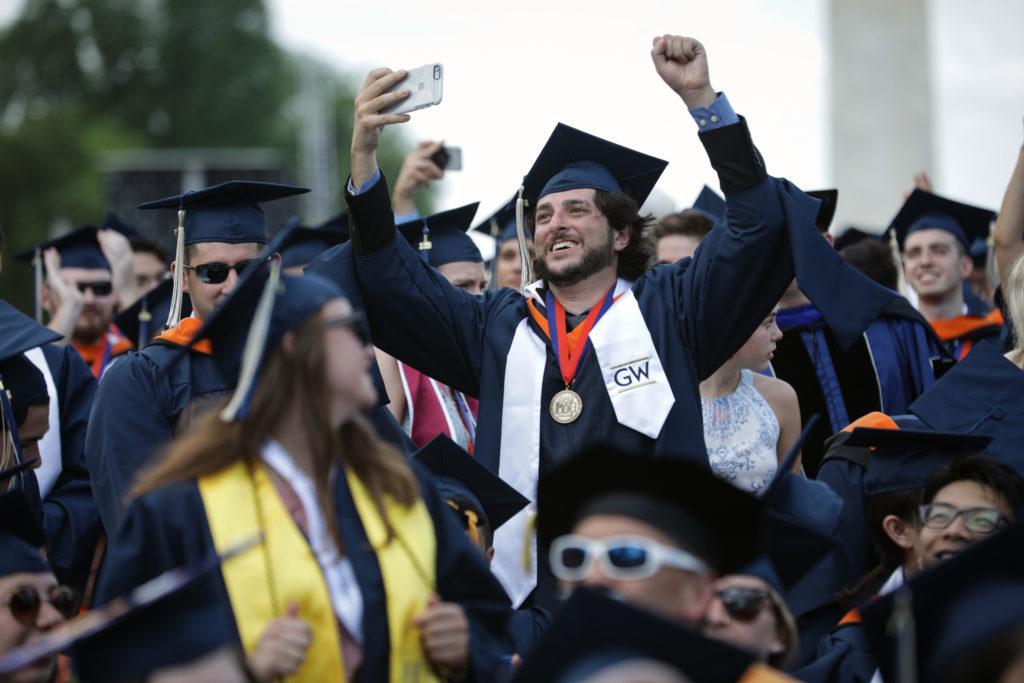Updated: May 21, 2018 at 6:25 p.m.
When Marcia McNutt was named the president of the National Academy of Sciences two years ago, she became the first woman to take on the title – but proving herself as a woman in a male-dominated field was nothing new to her.
As a doctoral student at the Scripps Institution of Oceanography, McNutt was told that the “deck was stacked against” her as the university’s only female geophysics student.
But after she graduated first in her class, “no one messed with me,” she said.
McNutt, who delivered the annual Commencement speech Sunday, told graduates that they should use their education to “see those doors that are opening ahead” and discover their purpose in life. She said graduates should remain hopeful – even in a society that lacks trust in the U.S. government.
“The diploma you will be given today from this great University is a powerful tool for you to discover your ‘why,’” she said. “I want you to find it and use it to bring hope back into this world.”
McNutt is the first woman to head the National Academy of Sciences and previously directed the U.S. Geological Survey, a scientific agency that studies natural resources. She also served as the editor in chief of Science, a national academic journal.
The speaker encouraged graduates to become “beacons of hope” in their careers by using their education to address extensive societal issues, like a declining life expectancy in the wake of drug epidemics in the U.S.
“The moral is, hope is contagious, and it’s a good kind of contagion,” she said. “It’s actually all around us, but there’s still not enough of it.”
[gwh_image id=”1058976″ credit=”Ethan Stoler | Contributing Photo Editor” align=”none” size=”embedded-img”]Marcia McNutt, president of the National Academy of Sciences, told graduates to be “beacons of hope” at the University Commencement ceremony Sunday. [/gwh_image]
There is a growing perception that the American dream is dying, McNutt said, as the country experiences a widespread opioid crisis and obesity epidemic. But she said the issues can be remedied with the technological advances and research that graduates across every school have pursued during their undergraduate careers.
“Hope is inspired when you can dream like the artist, show the heart of the humanist, formulate solutions with insight from the scientist and execute projects with the precision of an engineer,” she said.
McNutt delivered her speech to about 25,000 students, family members and friends at the National Mall in blistering heat that prompted dozens of students to leave their seats to find shade during the ceremony.
As she closed her speech, McNutt received a mix of boos and cheers. Several students criticized officials’ decision to name McNutt as Commencement speaker in March, saying officials selected her without input from students. The Student Association Senate passed a resolution earlier this month condemning the choice, saying McNutt, a scientist, is not reflective of a campus dominated by liberal arts majors.
University President Thomas LeBlanc defended the decision, asking, “doesn’t anyone have any shame” about criticizing McNutt and saying he could “live with” students’ dissatisfaction at the end of an interview with a campus radio station last month.
The University has hosted more high-profile speakers in recent years, like former first lady Michelle Obama in 2010, actress Kerry Washington in 2013 and Tim Cook, the chief executive officer for Apple in 2015.
LeBlanc also spoke to the class during the ceremony – his first commencement address as University president.
He encouraged graduates to commit to being leaders of their generation. He said that as members of the class contribute to society in their differing careers, they should aim to distinguish themselves from others in their fields.
[gwh_image id=”1058975″ credit=”Olivia Anderson | Photo Editor” align=”none” size=”embedded-img”]Graduates from the Class of 2018 sit in the crowd during the University’s Commencement ceremony. [/gwh_image]
“I think you’ll find during the lifelong journey of learning – what you discover will change you,” LeBlanc said. “I charge you to embrace that change in opinion, or in your life’s path, while never forgetting where you came from, how you got here and those who supported you along the way.”
McNutt also received an honorary degree at the ceremony alongside former University President Steven Knapp and Elana Meyers Taylor, a double-alumna and Olympic medalist in bobsledding.
Taylor said graduates should use their failures to push them toward success, pointing to her failed attempt to join the 2008 Olympic softball team. But she said the failure actually worked to her advantage because she later won three medals for Olympic bobsledding, most recently receiving a silver medal at the 2018 Winter Olympics in Pyeongchang.
“We’re really all not that different – I’ve sat in chairs there just like you, I’ve dreamed just like you have,” Taylor said. “I don’t know what your dream is, and I don’t know what comes next for you, but I know that all of you should continue to dream.”
Knapp said that during his tenure as University president, he noticed that students stood out in the way they committed to volunteerism in the District. Knapp launched the Freshman Day of Service in 2009, requiring that all freshmen participate in service projects during their first weeks on campus.
“Carry that spirit of service into whatever you do next,” he said. “Graduates – you are our future.”
Student speaker Meenu Mathews, an international affairs major, said her time at GW has equipped her with the resources to achieve larger career goals, like interning under former President Barack Obama’s administration.
“If there’s one thing I learned here during my time at GW, it is that each of us has the power to cross those fences, walk across lawns and open doors that we never even dreamed we could,” she said.
Lizzie Mintz contributed reporting.





